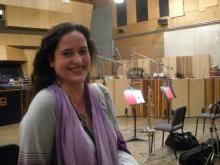Campus Author Interview: Dr. Karma Waltonen


In seeking out UC Davis campus authors, Dr. Karma Waltonen is a must. Not only is she an author and teacher, she’s president of the Margaret Atwood Society – which is devoted to studying the works of Atwood, who is perhaps best known as the author of The Handmaid’s Tale – and current editor of the peer-edited journal Margaret Atwood Studies. She also speaks at various ComicCons and at international conferences, and she won the 2015 Academic Federation Excellence in Teaching Award.

You describe yourself as a “Simpsonologist.” Where did your journey with The Simpsons begin, and what led to your book, The Simpsons in the Classroom: Embiggening the Learning Experience with the Wisdom of Springfield?
My journey with The Simpsons started with the very first bumper on The Tracey Ullman Show, in 1987. They hooked me, so I had the VCR all ready to go when they had their first episode in 1989. In 1999, when I got the opportunity to design a course for the first time, I went with The Simpsons. I’ve been teaching courses on it and incorporating it into my other courses, and I wanted to help others who wanted to teach the show, too. Denise Du Vernay is my co-author — she took over The Simpsons class at FSU when I went on to teach at UC Davis. We have a second book on the show with our publisher, McFarland, now.
The Simpsons really spoke to me — the family was more like mine than the perfect families on TV back then — they made mistakes, they watched TV, they complained about having to go to church. They also changed TV in that they didn’t have a laugh track. Back then, even cartoons did (Scooby Doo, The Flintstones). With no laugh track, you get a faster pace and better jokes. It wasn’t until Malcolm in the Middle in 2000 that another sitcom on mainstream TV took a chance like that.
I was watching The Tracey Ullman Show because I have always been interested in comedy performance and writing. So here I am, all these years later — I teach The Simpsons and courses on Writing & Performing Stand-Up. I get to visit studios, bring comics to campus, and spout off about cartoons on NPR. I’m an incredibly lucky woman. If you had told 13-year-old Karma that watching those bumpers on a variety would change her life…
Very serendipitous indeed! What do you think are the biggest challenges college professors and instructors currently face? What do you think might be some solutions to these challenges?
In terms of the challenges we face, I was just talking to a friend this morning about how we are teaching the information generation about research, but it’s challenging because they think they know how to find everything, but a lot of them don’t know about anything that’s beyond the first page of Google results. They don’t know which sources are good ones, that some online journals are only posing as journals to trick authors into giving them money, etc. In fact, I have a textbook coming out about finding, evaluating and using sources, with my other co-author, Melissa Bender.
And then there are the institutional challenges. I’m a lecturer, so I don’t have tenure. Teaching is my passion — I am thankful every day that I get to do it. But the university as a whole could treat teaching faculty and staff a lot better, which would reduce stress and increase productivity.
The challenge also becomes how to relay this message in a way that resonates with the necessary stakeholders. This is also true when it comes to library selection. As a scholar who studies and teaches about cartoons, what do you think graphic novels can add to a library’s collection?
I have taught classes on graphic novels, so having a good collection is essential for me. Having those books on the shelves also legitimizes the genre and reminds students that we have books in the library that they might actually want to read.
Exactly! What role do you see university libraries having on college campuses, now and in the future?
I wouldn’t want to teach the specialty courses I do without a strong university library behind me. When I’m teaching my pre-meds, I need our subject librarian to come in and provide help — I don’t want to go into the PubMed MESH. I don’t buy these materials. But Ruth Gustafson does. My students who work with her have stronger papers, and they’ll be better prepared when they start grad school.
For more information on Dr. Karma Waltonen, visit her faculty page. You can find her books at the UC Davis Library or the UC Davis Campus Bookstore.
Profile written by: Karen McCoy